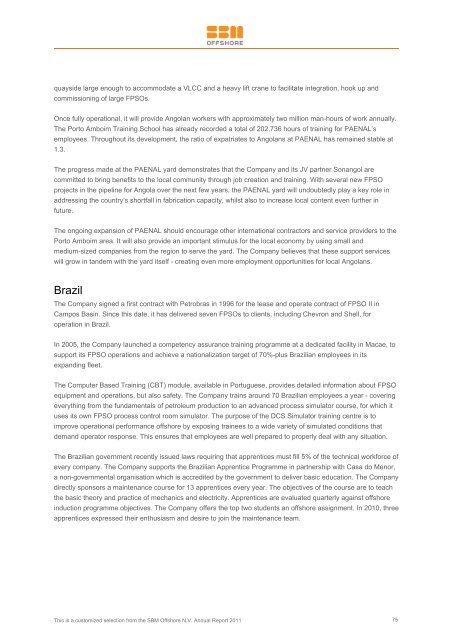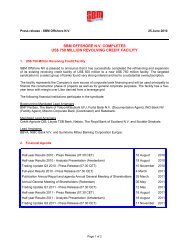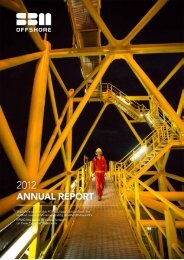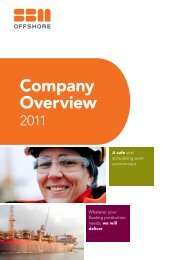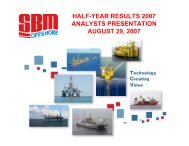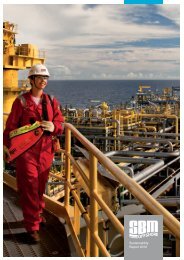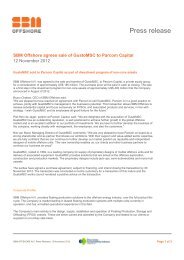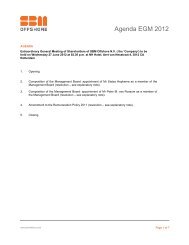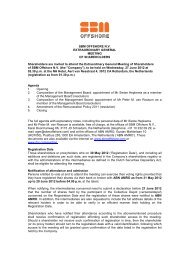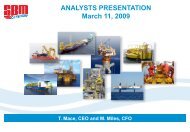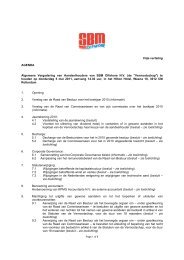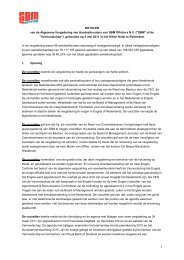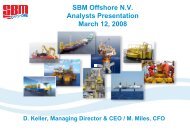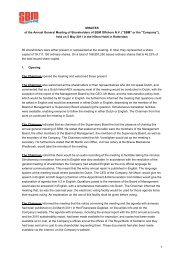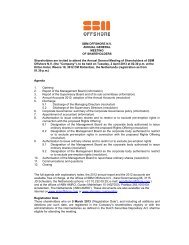2011 Annual Report - SBM Offshore
2011 Annual Report - SBM Offshore
2011 Annual Report - SBM Offshore
Create successful ePaper yourself
Turn your PDF publications into a flip-book with our unique Google optimized e-Paper software.
quayside large enough to accommodate a VLCC and a heavy lift crane to facilitate integration, hook up and<br />
commissioning of large FPSOs.<br />
Once fully operational, it will provide Angolan workers with approximately two million man-hours of work annually.<br />
The Porto Amboim Training School has already recorded a total of 202,736 hours of training for PAENAL’s<br />
employees. Throughout its development, the ratio of expatriates to Angolans at PAENAL has remained stable at<br />
1.3.<br />
The progress made at the PAENAL yard demonstrates that the Company and its JV partner Sonangol are<br />
committed to bring benefits to the local community through job creation and training. With several new FPSO<br />
projects in the pipeline for Angola over the next few years, the PAENAL yard will undoubtedly play a key role in<br />
addressing the country’s shortfall in fabrication capacity, whilst also to increase local content even further in<br />
future.<br />
The ongoing expansion of PAENAL should encourage other international contractors and service providers to the<br />
Porto Amboim area. It will also provide an important stimulus for the local economy by using small and<br />
medium-sized companies from the region to serve the yard. The Company believes that these support services<br />
will grow in tandem with the yard itself - creating even more employment opportunities for local Angolans.<br />
Brazil<br />
The Company signed a first contract with Petrobras in 1996 for the lease and operate contract of FPSO II in<br />
Campos Basin. Since this date, it has delivered seven FPSOs to clients, including Chevron and Shell, for<br />
operation in Brazil.<br />
In 2005, the Company launched a competency assurance training programme at a dedicated facility in Macae, to<br />
support its FPSO operations and achieve a nationalization target of 70%-plus Brazilian employees in its<br />
expanding fleet.<br />
The Computer Based Training (CBT) module, available in Portuguese, provides detailed information about FPSO<br />
equipment and operations, but also safety. The Company trains around 70 Brazilian employees a year - covering<br />
everything from the fundamentals of petroleum production to an advanced process simulator course, for which it<br />
uses its own FPSO process control room simulator. The purpose of the DCS Simulator training centre is to<br />
improve operational performance offshore by exposing trainees to a wide variety of simulated conditions that<br />
demand operator response. This ensures that employees are well prepared to properly deal with any situation.<br />
The Brazilian government recently issued laws requiring that apprentices must fill 5% of the technical workforce of<br />
every company. The Company supports the Brazilian Apprentice Programme in partnership with Casa do Menor,<br />
a non-governmental organisation which is accredited by the government to deliver basic education. The Company<br />
directly sponsors a maintenance course for 13 apprentices every year. The objectives of the course are to teach<br />
the basic theory and practice of mechanics and electricity. Apprentices are evaluated quarterly against offshore<br />
induction programme objectives. The Company offers the top two students an offshore assignment. In 2010, three<br />
apprentices expressed their enthusiasm and desire to join the maintenance team.<br />
This is a customized selection from the <strong>SBM</strong> <strong>Offshore</strong> N.V. <strong>Annual</strong> <strong>Report</strong> <strong>2011</strong><br />
75


